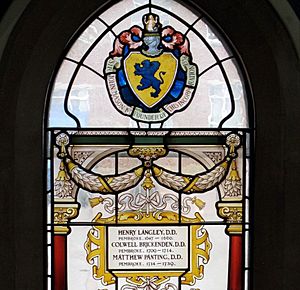Henry Langley (Master of Pembroke) facts for kids
Henry Langley (1611–1679) was an English clergyman and a smart scholar. He became the leader, or Master, of Pembroke College, Oxford, during a time of big changes in England. Later, he lost his official church job but continued to teach and preach as a nonconformist.
Contents
Henry Langley: A Life of Learning and Change
Early Life and Education
Henry Langley was born in 1611 in Abingdon, Berkshire. His father, Thomas Langley, was a shoemaker. Henry went to John Roysse's Free School in Abingdon, which is now known as Abingdon School, from 1622 to 1627.
After school, he joined Magdalen College, Oxford, as a chorister in 1627. In 1629, he officially joined Pembroke College. He later became a Fellow there, which means he was a senior member of the college. He earned several degrees: a Bachelor of Arts (B.A.) in 1632, a Master of Arts (M.A.) in 1635, a Bachelor of Divinity (B.D.) in 1648, and a Doctor of Divinity (D.D.) in 1649.
A Leader at Oxford
In 1643, Henry Langley became the rector (a type of church leader) of St. Mary's church in Newington, Surrey. This was during the English Civil War, a time when Parliament was fighting against the King.
In 1646, Parliament chose him as one of seven ministers to help change how the University of Oxford was run. He was allowed to preach in any church in Oxford to help scholars accept the new rules from Parliament.
When the Master of Pembroke College, Thomas Clayton, passed away in 1647, the college fellows chose someone else. However, Parliament stepped in and chose Henry Langley instead. He officially became the Master of Pembroke College on October 8, 1647.
What is a Master of a College?
A Master is like the head or principal of a college at a university. They are in charge of running the college, overseeing its students and staff, and making important decisions.
Langley also took on other important roles at the university. He helped make decisions for the university and was part of a group that checked students applying for scholarships and fellowships. In 1648, he also became a canon of Christ Church, which is another important position within the university and church.
Life After the Restoration
Henry Langley held his positions at Pembroke College and Christ Church until 1660. This was when the monarchy was restored in England, meaning the King came back to power after the Civil War. Many people who had supported Parliament, like Langley, lost their jobs. This event is known as the English Restoration.
After losing his official roles, Langley moved to Tubney, near Abingdon. He continued to teach students from his home, focusing on subjects like logic and philosophy.
In 1672, a new law called the Declaration of Indulgence allowed some religious groups, called dissenters, to practice their faith more freely. Langley was chosen to continue preaching in Oxford, even though the university authorities didn't like it. He often preached at a house in Broken Hayes.
Henry Langley passed away around September 10, 1679, and was buried in St. Helen's Church in Abingdon.
See also
- List of Old Abingdonians
 | Bayard Rustin |
 | Jeannette Carter |
 | Jeremiah A. Brown |


